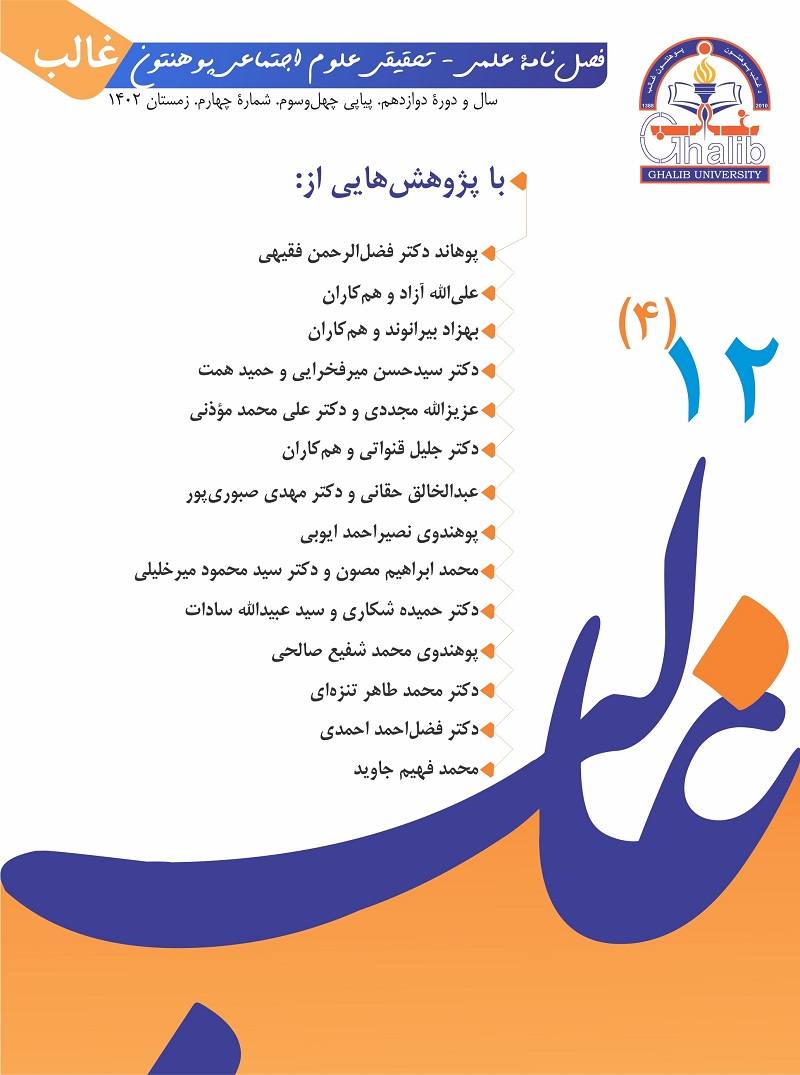Existential Determination in Imam Rabbani's Ontology and his criticism of the Levels of Existence in Ibne Arabi's School
DOI:
https://doi.org/10.58342/ghalibqj.V.12.I.4.5Keywords:
Imam Rabbani, Ibn Arabi, love and existential determination, Ontology, Mohammadi truthAbstract
Imam Rabani (Majdad Alif-Sani), who lived at the end of the ninth and the beginning of the tenth century of Hiri is one of the greatest mystics of recent centuries and has new views in Sufism and mysticism. He emphasized the theory of the intuition unity in contrast to the existential unity of Muheyuddin Ibne Arabi and his followers, even though he, in fact, experienced the existential unity for many years, But in the end, he passed through its conditions and knowledge and made a wide scientific-critical discourse against his theory of ontological unity; Imam Rabbani took the effort to criticize it and with the help of explicit discoveries, texts and intellectual proofs, he considered the mystical theories of existential unity from understanding the facts and levels of existence to be incomplete and reformable.This research, which was carried out by analytical-comparative method on the opinions of Imam Rabbani, aims to study the mentioned issue. Despite the fact that Imam Rabbani does not agree with the use of terms such as "determination" since it has become a term among the sages, it is unnecessarily used. The findings of the research show that Imam Rabbani considers the first determination to be a loving (Hobbi) or existential (Vojodi) determination, that the light of this determination is based on divine truths (Haqayeq_e_Elahiye) (Ka'aba, Holy Quran, Salah, and Pure divinity) and these truths have an unknown connection to God. The second determination in his belief is the dignity of life (Sha'an_ol_hayat) and the third determination is the dignity of knowledge (Sha'an_ol_elm). In simple words, above the first determination that Ibn Arabi stated, Imam Rabbani proves five other determinations or truths (Sha'an_ol_hayat, the chastity (Khullat), to be loved (Mohebbiyat), to love or popularity (Mahbobiat), and the pure love (Hobb_e_serfe).
References
قرآن کریم.
ابن عربی، محییالدین. (بیتا). الفتوحات المکیه. بیروت: دار صادر.
ابن عربی، محییالدین. (2002م). رسائل ابن عربی. ج 1. تحقیق و تقدیم: سعید عبدالفتاح. بیروت: مؤسسه الانتشارات العربی.
ابهری، اثیرالدین. (2019). هدایة الحکمه مع حاشیتها درایة الحکمة. کراچی: مکتبة المدینه.
احمدی، میثم؛ شریفیان، مهدی. (1395). «نقد و بررسی دیدگاههای ابن عربی از منظر شیخ احمد سرهندی». ایران: نشریۀ پژوهشهای ادب عرفانی (گوهر گویا).10(2). صص 19-42.
امام ربانی، شیخ احمد سرهندی. (1397). مکتوبات امام ربانی. دورۀ چهارجلدی. مقدمه و تراجم: عارف نوشاهی. مشهد: تربت جام.
امام ربانی، شیخ احمد سرهندی. (1977). مکتوبات امام ربانی. به تصحیح نوراحمد امرتسری. پشاور: ایجوکشنل پریس.
امام ربانی، شیخ احمد سرهندی. (1348 هـ). مکاشفات عینیه. کراچی: ناشر ادارۀ مجددیه کراچی.
جامی، عبدالرحمن. (1360). سه رساله در تصوف: لوامع و لوایح به انضمام شرح رباعیات در وحدت وجود. تهران: انتشارات منوچهری.
جامی، عبدالرحمن. (1370). نقدالنصوص فی شرح نقش الفصوص. مقدمه و تصحیح ولیام چیتیک. تهران: مؤسسه مطالعات و تحقیقات فرهنگی.
جامی، عبدالرحمن. (بیتا). شرح رباعیات در وحدت وجود. تهران: کتابخانۀ منوچهری.
جامی، عبدالرحمن. (1378). مثنوی هفت اورنگ. تهران: نشر میراث مکتوب.
جرجانی، میرسیدشریف. (بی¬تا). معجم التعریفات. تحقیق و دراسه: محمد صدیق المنشاوی. القاهره: دارالفضیله.
جنگجو، محسن؛ زروانی،مجتبی. (1395). «وجودشناسی عرفانی به روایت شیخ احمد سرهندی». ایران: نشریۀ پژوهشهای هستیشناختی. 5(9). صص 21-43.
زنوزی، ملا عبدالله. (1361). منتخب الخاقانی فی کشف حقایق عرفانی. به تصحیح نجیب مایل هروی. تهران. انتشارات مولی.
سیدزاده، نصیراحمد؛ خلیلی جهانتیغ، مریم و بارانی، محمد. (1401). «وجودشناسی عرفانی شیخ سرهندی و بازتعریف وی از مرتبۀ وهم». دانشگاه سیستان و بلوچستان. نشریۀ مطالعات شبهقاره. 14(43).
هوتکی، نصرالله. (1977). شرح مکتوبات قدسی آیات محبوب سبحانی، امام ربانی، حضرت مجدد الف ثانی سرهندی. کراچی: ناشر ادارۀ مجددیه.
References
Holy Quran.(Arabic)
Ibn Arabi, Muhyiddin. (Beta). Al-Futuhat al-Makiyya. Beirut: Dar Sader. (Arabic)
Ibn Arabi, Muhyiddin. (2002). Letters of Ibn Arabi. C 1. Research and presentation: Saeed Abdul Fattah. Beirut: Al-Arabi Publishing House. (Persian)
Abhari, Athiruddin. (2019). The gift of wisdom with the margins of wisdom. Karachi: Madina School. (Arabic)
Ahmadi, Maitham; Sharifian, Mehdi. (2015). "Criticism and examination of Ibn Arabi's views from the perspective of Sheikh Ahmad Sarhandi". Iran: Journal of Esfani Literature Researches (Gohar Goya). 10(2). pp. 19-42. (Persian)
Imam Rabbani, Sheikh Ahmad Sarhandi. (2017). Letters of Imam Rabbani. Four-volume course. Introduction and translation: Aref Noshahi. Mashhad: Torbat Jam. (Persian)
Imam Rabbani, Sheikh Ahmad Sarhandi. (1977). Letters of Imam Rabbani. Edited by Noor Ahmad Amritsari. Peshawar: Educational Press. (Persian)
Imam Rabbani, Sheikh Ahmad Sarhandi. (1348 AH). Objective revelations. Karachi: Publisher of Mujadadiyeh Karachi. (Persian)
Jami, Abdulrahman. (1360). Three treatises on Sufism: Luwa'am and Lawaih, including the explanation of the quatrains in the unity of existence. Tehran: Manochehri Publications. (Persian)
Jami, Abdulrahman. (1370). Criticism of the texts in the description of Naqsh al-Fusus. Introduction and proofreading by William Chittick. Tehran: Institute of Cultural Studies and Research. (Persian)
Jami, Abdul Rahman. (Beta). Description of quatrains in the unity of existence. Tehran: Manochehri Library. (Persian)
Jami, Abdul Rahman. (1378). Masnavi Haft Aurang. Tehran: Written Heritage Publishing. (Persian)
Jurjani, Mirsydsharif. (Beta). Glossary of definitions. Research and studies: Mohammad Sediq al-Manshawi. Cairo: Dar Al-Fazilah. (Persian)
Warrior, Mohsen; Zarvani, Mojtabi. (2015). "Mystic ontology according to Sheikh Ahmed Sarhandi". Iran: Journal of Ontological Researches. 5(9). pp. 21-43. (Persian)
Zenozi, Mullah Abdullah. (1361). Al-Khaqani's selection in the discovery of mystical facts. Edited by Najib Mile Hervey. Tehran. Molly Publications. (Persian)
Seyedzadeh, Nasir Ahmad; Khalili Jahantigh, Maryam and Barani, Mohammad. (2022). "The mystical ontology of Sheikh Sarhandi and his redefinition of the order of illusion". University of Sistan and Baluchestan. Journal of Subcontinental Studies. 14(43). (Persian)
Hotaki, Nasrallah. (1977). Commentary on the sacred texts of the beloved verses of Sobhani, Imam Rabbani, Hazrat Mujaddid al-Thani Sarhandi. Karachi: Mujaddiyeh publisher. (Persian)
Downloads
Published
How to Cite
Issue
Section
License
Copyright (c) 2023 عزیزالله مجددی،دکتر علی محمد مؤذنی

This work is licensed under a Creative Commons Attribution 4.0 International License.













